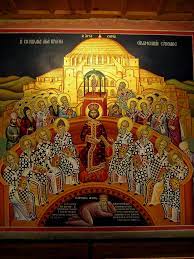Note: The following article appeared in The Anglican Way 2.3 (2023), Used with permission.
In a recent online article, three prominent North American Anglican theologians ask whether the “Reset” announced in the so-called “Kigali Commitment” of the recent Global Anglican Future Conference in Rwanda (GAFCON IV) is truly Anglican.
The article opens with an appreciation of the Gafcon/Global South movement for its courage in standing firm against “neocolonial demands to accept the hegemony of the sexual revolution.” But, the writers continue, “we are concerned that in an admirable attempt to resist the liberal project, they unwittingly have opened the door to the use of Scripture for liberal ends.”
In particular, they question the language of one section on “The Authority of God’s Word.” Here is the offending text, which they characterize as a “sola scriptura hermeneutic”:
Some within the Communion have been taken captive by hollow and deceptive philosophies of this world (Colossians 2:8). Such a failure to hear and heed God’s Word undermines the mission of the church as a whole.
The Bible is God’s Word written, breathed out by God as it was written by his faithful messengers (2 Timothy 3:16). It carries God’s own authority, is its own interpreter, and it does not need to be supplemented, nor can it ever be overturned by human wisdom.
The final sentence taken by itself articulates a current of Puritan theology which is uncharacteristic of mainstream Anglican orthodoxy, including many Anglican Evangelicals. In what way is the Bible its own interpreter apart from human interpretation? Is all theological reflection that does not derive from biblical texts “hollow and deceptive”?
I doubt that the authors of the Kigali Commitment intend to make this definition of biblical authority a central debating point, since they go on to cite the Jerusalem Declaration from GAFCON 2008, which reads:
2. We believe the Holy Scriptures of the Old and New Testaments to be the Word of God written and to contain all things necessary for salvation. The Bible is to be translated, read, preached, taught and obeyed in its plain and canonical sense, respectful of the church’s historic and consensual reading.
The Jerusalem Declaration better represents the normative Anglican doctrine on this matter, being itself based on classic Anglican formularies.[*] The first of the supporting formulary texts is the historic Canon A5 of the Church of England, which is quoted in italics in the text of the Jerusalem Statement:
The doctrine of the Church is grounded in the Holy Scriptures and in such teachings of the ancient Fathers and Councils of the Church as are agreeable to the said Scriptures. In particular, such doctrine is to be found in the Thirty-nine Articles of Religion, the Book of Common Prayer and the Ordinal.
And what is the doctrine to be found in the Thirty-nine Articles? Article VI – “On the sufficiency of the Holy Scriptures for salvation” – reads:
Holy Scripture containeth all things necessary to salvation: so that whatsoever is not read therein, nor may be proved thereby, is not to be required of any man, that it should be believed as an article of the Faith, or be thought requisite or necessary to salvation. In the name of the holy Scripture we do understand those Canonical Books of the Old and New Testament, of whose authority was never any doubt in the Church.
The term “sufficiency” frames the teaching of the biblical canon in terms of toward a particular end, as Richard Hooker notes: “The main drift of the whole New Testament is that which St. John setteth down; ‘These things are written that ye might believe that Jesus is Christ the Son of God, and that in believing ye might have life through his name’” (Laws 1.14.4).
Similarly, the famous Collect on Holy Scripture penned in the Prayer Book by Thomas Cranmer couples the divine inspiration of Scripture with a particular human process of interpretation directed toward the “hope of everlasting life”:
Blessed Lord, who hast caused all holy Scriptures to be written for our learning: Grant that we may in such wise hear them, read, mark, learn, and inwardly digest them, that by patience and comfort of thy holy Word, we may embrace and ever hold fast the blessed hope of everlasting life, which thou hast given us in our Saviour Jesus Christ. Amen.
Finally, Article XX applies the doctrine of the sufficiency of Scripture to the authority of the Church:
The Church hath power to decree rites or ceremonies, and authority in controversies of faith; and yet it is not lawful for the Church to ordain anything that is contrary to God’s word written, neither may it so expound one place of Scripture that it be repugnant to another. Wherefore, although the Church be a witness and a keeper of Holy Writ; yet, as it ought not to decree anything against the same, so besides the same ought it not to enforce anything to be believed for necessity of salvation.
The Gafcon movement came together because global Anglicans became convinced that certain Anglican churches were preaching a false gospel Gospel (Galatians 1:8) by recognizing and blessing practices that were “contrary to Scripture,” thereby endangering the flock of Christ and the integrity of the Anglican Communion.
Therefore, since the Kigali Commitment refers to the Jerusalem Declaration and the related formularies, it may be charitably concluded that the later statement in 2023 is to be interpreted as consistent with and not critical of the former in 2008 and does not by itself render the theological moorings of Anglican realignment un-Anglican.
In questioning the Kigali statement, the authors, as I see it, make an equally problematic claim that “without tradition as norm and guide, the canonical context and clarity of Scripture are meaningless.” The Great Tradition of Christian reading of Scripture, from the first century to our own day, gives ample testimony that the Scriptures are in themselves sufficiently clear, independent of “tradition.” I think the Fathers, who often disputed with one another on matters of biblical interpretation, would be surprised to find out that their writings warrant the doctrine of the Church.
As noted above, the three theologians warn that “a strict sola scriptura hermeneutic, which fails to recognize the Bible’s origin in the ancient Church and its authoritative interpretation by the Church fathers and creeds, opens the way to a liberal method in which every reader serves as his own authority.” While I agree that those who think the teaching of the Bible is self-evident run the risk of importing their own cultural presuppositions, this risk is addressed in the Jerusalem Declaration’s provision that “the Bible is to be translated, read, preached, taught and obeyed in its plain and canonical sense, respectful of the church’s historic and consensual reading.” Surely slippery slopes can slide in more than one direction, and finding liberal trajectories are just as likely among “Affirming Catholics” as with “open Evangelicals.” In both cases, the plain sense of Scripture stands as the best guardian of true doctrine.
In support of their position, the authors go on to cite the authority of Richard Hooker, who they say “recognized that there is no such thing as Scripture without tradition.” To be sure, Hooker’s main opponents were Puritans who claimed that Scripture contained as necessary truth “all things simply,” and he, like most of the Reformers, commended “antiquity” and cited the testimony of the Fathers frequently, but it does not follow that he made “tradition” a necessary leg of biblical authority.[†] In a succinct summary of his hermeneutic, Hooker states:
Be it in matter of the one kind or of the other, what Scripture doth plainly deliver, to that the first place of credit [faith] and obedience is due; the next whereunto is whatever any man can necessarily conclude by force of [sanctified] reason; after these the voice of the Church succeedeth. That which the Church by her ecclesiastical authority shall probably [i.e., in indifferent matters] think and define to be true or good, must in congruity of reason overrule all other inferior judgments whatsoever. (Laws, 5.8.2)
The question of Scripture and tradition calls for serious discussion among orthodox Anglicans. The critics of Kigali make no direct comment on the Jerusalem Declaration and its normative role in the Gafcon movement. Indeed, I would propose that the Jerusalem Declaration provides a sound starting point – a via media, if you will – among the contemporary “traditions” of orthodox Anglicanism.
[*] I am using the term “normative” advisedly, recalling the Reformers’ distinction between Scripture as the “norming norm” and tradition as the “normed norm.” Church doctrine and tradition must be “proved” by warrant of Scripture, and all churches, however historic, have erred not only in their traditions but also in matters of faith (Article XIX).
[†]See the interesting perspective by Mark LeTourneau on “Richard Hooker and the Sufficiency of Scripture” can be found online at the Journal of Anglican Studies (2016)134-155.
Photo: Archbishop Henry Ndukuba of Nigeria reads the Kigali Commitment.




